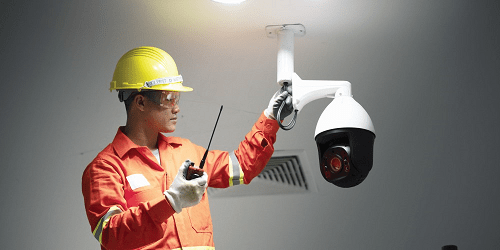
10.14.19 – SSI – Erin Harrington
SSI talks with maintenance and service specialists who explain coverage agreements, pricing, execution and more.
A strong and steady stream of recurring monthly revenue (RMR) is the lifeblood of a good many successful installing security contractor businesses. Maintenance and service (M&S) agreements can catalyze increased RMR, while allowing today’s security dealers and integrators to build and grow their infrastructure on a solid foundation that also better serves their end customers.
Selling M&S contracts as an integral part of their overall solutions makes good dollars and sense as it increases a security company’s overall value and customer loyalty. Ahead, several leading security providers explain the what and how behind selling, servicing, maintaining and extending these high-valued contracts.
M&S Contract Variations
Brian Duckworth, sales consultant at Blue Sky Technologies in Jonesboro, Ark., explains M&S contracts significantly impact his company’s overall profitability. As a voice and data integrator moving into the physical security space, Blue Sky is accustomed to seeing M&S revenues represent on average of 40%-60% of its overall company revenue.
Noting the importance of the RMR model, he adds that M&S contracts consistently generate RMR, which helps augment hardware and service sales and alleviates or, at least, reduces monthly operational expenses.
“Our goal is to provide a security solution, not just make a sale, so we seek to manage our systems on an end-to-end basis because we believe it delivers a better experience and more value for the client,” Lynn adds.
Kastle is a leading provider of managed access control systems, which requires a long-term relationship — not a transaction. It’s important because security systems operate effectively only when they are well maintained and serviced, Lynn says.
“Since we’re the security provider, we take comprehensive responsibility of the system — design, installation, monitoring, maintenance, service, updates. RMR is just how we get paid for our best-in-class security service.”
Carey Boethel, CEO of Santa Ana, Calif.-based Securadyne Systems, now part of Allied Universal Technology Services, advises the best way to sell a M&S contract is to position it as an integral, inseparable part of the overall solution.
“The benefits of it should be articulated as early as possible during the sales cycle, and it should be proposed concurrently with the design and installation of systems,” he recommends. “It shouldn’t be an afterthought. It should be sold upfront and in conjunction with the installation.”
Duckworth concurs that selling service contracts at the point of sale is clearly the way to go.
“We always try to make sure the client understands the value of the M&S contract, understands the true cost of a down system, and the potential liability they face when something isn’t working,” he says.
There are a few different variants of M&S contracts, Boethel explains, such as with or without preventative maintenance or the inclusion of replacement parts. The baseline service agreement provides the customer with a service level agreement (SLA) that promises response and remediation within a certain timeframe. This is an enhancement over every day “break/fix” service calls, he explains, and the response to which is best effort without a commitment on responsiveness.
“Building upon the baseline SLA, some agreements include quarterly, semi-annual or annual preventive maintenance, and some include replacement of defective equipment at no cost to the end-user,” Boethel says.
“For example, it’s common for an M&S contract to define which pieces of equipment are considered critical and therefore the highest priority,” he says. “Typically, service providers estimate the cost of the contracts formulaically based on the value of the installed equipment. If the contract includes preventative maintenance, then it would also lay out the schedule and objectives of the maintenance program.”
Kastle Systems promises clients an end-to-end managed security solution so they can focus on their core business, while Kastle monitors and maintains their security. The service and maintenance clients receive design, hardware, software, installation, updates, maintenance, service and monitoring.
There is an initial purchase and installation fee, Lynn notes, but that’s included at the front-end of every RMR-based contract. Kastle’s RMR fees are structured based on extent of their security coverage.
Blue Sky Technologies’ typical M&S contracts are generally break/fix in nature and provide a guaranteed SLA to repair any damaged hardware/software during the contract term.
“The pricing model will vary by market, competitive environment and client relationship/needs,” Duckworth explains. “You quickly learn which customers tend to require more help than others to assist in pricing future contracts based on the actual labor effort expended.”
For those security companies that also work in the fire/life-safety sector, keep in mind that one of the fundamental differences between security and fire/life-safety M&S contracts is that fire tests and inspections are mandated by code.
“Preventative maintenance of security systems is almost entirely discretionary, but life-safety code requires that fire-alarm monitoring systems be actively and systematically maintained,” Boethel cautions.

Maintenance and service contracts should be discussed with the end customer early in the sales cycle and proposed concurrently with the design and installation of systems.
Show Me the Money
M&S contracts can translate into impressive profit margins for security companies that posture them correctly. As Boethel points out, “From an enterprise valuation standpoint, revenue from maintenance and service contracts can be as much as twice as valuable as installation revenues due to gross margin differences. This contract revenue should not be confused with subscription-based RMR, such as alarm monitoring, managed services, etc., which typically cannot be cancelled for convenience like M&S contracts.”
Subscription-based RMR, Boethel continues, can be 3x to 5x more valuable than installation revenues on a dollar-for-dollar basis, assuming current market valuation metrics.
“Regardless of whether its M&S or subscription-based RMR, owners wishing to maximize enterprise value should focus on growing these recurring revenue streams,” he says.
It makes good dollars and sense to do so because as Lynn points out, as the recurring base of business grows, there is stability to that revenue and scalability in the way customers are being served.
“Because the revenue base renews it lowers our cost of sales because we are only acquiring new business, and existing business comes back without investment of additional sales to get it,” Lynn adds. “Kastle is the original managed security company and providing ongoing security for our clients is fundamental to our being. Our business is designing and installing systems, then running them including not only maintaining and servicing them, but also providing the monitoring. There is no separation. RMR is how you get paid for the service.”
M&S business can be critical to building company value and profitability. Duckworth explains, “It allows us multiple touch points throughout the year to perform scheduled maintenance and illustrate the value of the contract to the end user while allowing us to provide a consistent revenue stream on a monthly basis at higher margins for our business needs.”
Financially, M&S-generated RMR provides high-margin and predictable revenue streams that are financeable and, historically, have commanded attractive values, Boethel states.
“We’re in the business of protecting people and assets, and maintenance and service RMR creates a win-win for us and our customers,” he adds. “Our customers have one service provider to deal with who understands their security environment and systems, has the technical expertise and resources on-call to be there for emergency response, as well as ongoing maintenance and periodic inspections. Customers have access to technology upgrades for the lifecycle of the system from their trusted security partner, all at a known budgetary cost each month.”
The peace of mind that ongoing revenues provide are priceless. M&S contracts are a huge part of that peace of mind. As Duckworth emphasizes, “It allows to illustrate the value of the contract to the end user, while allowing us to provide a consistent revenue stream on a monthly basis at higher margins for our business needs.”
And Lynn further explains if dealers do not retain the responsibility of maintenance and service for the system you are providing, you don’t have control over its performance. Hence, you lose the ability to impact the satisfaction of the client.
“Beyond maintaining the operational effectiveness of the system,” Lynn continues, “M&S contracts allow you to keep engaged with the customer and build enduring relationships through service that leads to even stronger renewal rates and higher likelihood of follow on revenue and account growth.”
Erin Harrington has 20+ years of editorial, marketing and PR experience within the security industry. Contact her at erinharrington1115@gmail.com.
